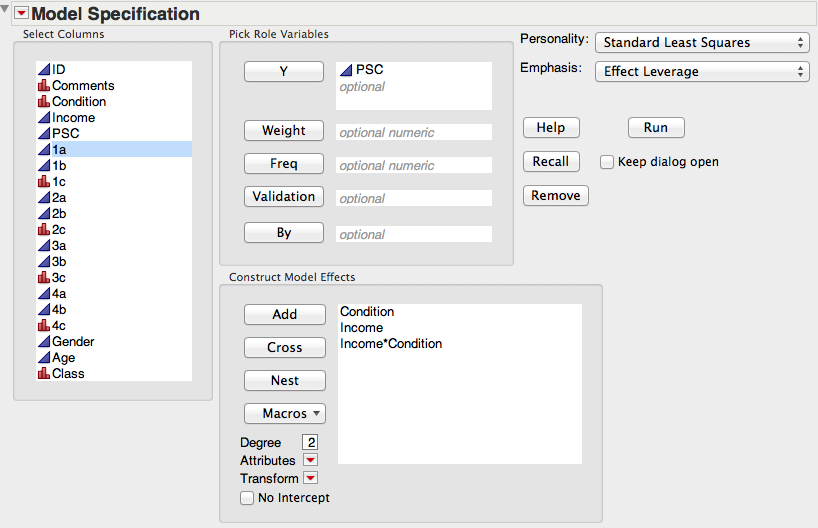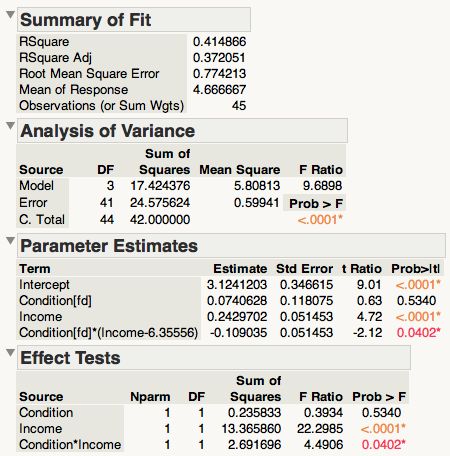I recently started transitioning from JMP to R and to get started, I've been trying to reproduce some of my old JMP results in R. However, when I run a multiple regression with one continuous variable (income) and one categorical variable (condition) predicting a continuous variable (psc), the results from the 2 programs differ.
Here's my JMP model and results:


And here's my R code and results:
> library(plyr)
> # load data files
> online <- read.csv('r_online.csv')
> paper <- read.csv('r_paper.csv')
> # define conditions for online data
> online$condition <- NA
> levels(online$condition) <- c('wc','fd')
> online[!is.na(online$Ntrl1), 'condition'] <- 'wc'
> online[!is.na(online$Ntrl3), 'condition'] <- 'fd'
> online$condition <- factor(online$condition)
> # merge online and paper data
> mydata <- rbind.fill(online, paper)
> # exclude dropped data
> mydata <- subset(mydata, Class < 5)
> # calcualte psc
> psc <- ((8-mydata$PSF1r)+(8-mydata$PSF2r)+mydata$PSF3+(8-mydata$PSF4r)+(8-mydata$PSF5r)+mydata$PSF6)/6
> mydata$psc <- psc
> # save income and condition as values
> income <- mydata$Income
> condition <-mydata$condition
> # psc by income and condition
> psc.income.regress <- lm(psc ~ income * condition)
> summary(psc.income.regress)
Call:
lm(formula = psc ~ income * condition)
Residuals:
Min 1Q Median 3Q Max
-1.7275 -0.3585 0.0731 0.5122 1.1602
Coefficients:
Estimate Std. Error t value Pr(>|t|)
(Intercept) 3.89116 0.50804 7.659 1.96e-09 ***
income 0.13393 0.07494 1.787 0.0813 .
conditionwc -1.53409 0.69323 -2.213 0.0325 *
income:conditionwc 0.21807 0.10291 2.119 0.0402 *
---
Signif. codes: 0 ‘***’ 0.001 ‘**’ 0.01 ‘*’ 0.05 ‘.’ 0.1 ‘ ’ 1
Residual standard error: 0.7742 on 41 degrees of freedom
(4 observations deleted due to missingness)
Multiple R-squared: 0.4149, Adjusted R-squared: 0.3721
F-statistic: 9.69 on 3 and 41 DF, p-value: 5.854e-05
So, R-squared, R-squared Adjusted, Overall F, Overall p, and p and t for the interaction are the same in both R and JMP, but p and t for the main effects and all of the Estimates are different.
I did some reading and found that this occurs because JMP calculates Type-III sums of squares, while R calculates Type-I SS. So far, though, I haven't been able to figure out how to get R to calculate Type-III SS in the same way as JMP.
One site said that I could get Type-III SS by changing the last part of my R code to this:
> ### alternative method suggested for getting type-III SS ###
> options(contrasts=c("contr.sum","contr.poly"))
> psc.income.regress <- lm(psc ~ income * condition)
> drop1(psc.income.regress,~.,test="F")
Single term deletions
Model:
psc ~ income * condition
Df Sum of Sq RSS AIC F value Pr(>F)
<none> 24.576 -19.2208
income 1 13.3659 37.941 -1.6778 22.2985 2.729e-05 ***
condition 1 2.9354 27.511 -16.1434 4.8972 0.03253 *
income:condition 1 2.6917 27.267 -16.5438 4.4906 0.04018 *
---
Signif. codes: 0 ‘***’ 0.001 ‘**’ 0.01 ‘*’ 0.05 ‘.’ 0.1 ‘ ’ 1
> summary(psc.income.regress)
Call:
lm(formula = psc ~ income * condition)
Residuals:
Min 1Q Median 3Q Max
-1.7275 -0.3585 0.0731 0.5122 1.1602
Coefficients:
Estimate Std. Error t value Pr(>|t|)
(Intercept) 3.12412 0.34662 9.013 2.82e-11 ***
income 0.24297 0.05145 4.722 2.73e-05 ***
condition1 0.76704 0.34662 2.213 0.0325 *
income:condition1 -0.10904 0.05145 -2.119 0.0402 *
---
Signif. codes: 0 ‘***’ 0.001 ‘**’ 0.01 ‘*’ 0.05 ‘.’ 0.1 ‘ ’ 1
Residual standard error: 0.7742 on 41 degrees of freedom
(4 observations deleted due to missingness)
Multiple R-squared: 0.4149, Adjusted R-squared: 0.3721
F-statistic: 9.69 on 3 and 41 DF, p-value: 5.854e-05
Now all the estimates for income, interaction, and the intercept are the same in R as in JMP, but condition is still different.
Another person suggested that I recode my conditions as numeric contrasts (instead of having them as factors) and center everything, so I changed the end of my code to this:
> ### 2nd alternative method: change condition to numeric contrast and center variables ###
> condition_c <- ifelse(condition == 'fd', +.5, -.5)
> condition_c <- scale(condition_c, scale=F,center=T)
> income_c <- scale(income,scale=F,center=T)
> psc.income.regress <- lm(psc ~ income_c * condition_c)
> summary(psc.income.regress)
Call:
lm(formula = psc ~ income_c * condition_c)
Residuals:
Min 1Q Median 3Q Max
-1.7275 -0.3585 0.0731 0.5122 1.1602
Coefficients:
Estimate Std. Error t value Pr(>|t|)
(Intercept) 4.67891 0.11588 40.379 < 2e-16 ***
income_c 0.22739 0.05241 4.338 9.13e-05 ***
condition_c 0.14813 0.23615 0.627 0.5340
income_c:condition_c -0.21807 0.10291 -2.119 0.0402 *
---
Signif. codes: 0 ‘***’ 0.001 ‘**’ 0.01 ‘*’ 0.05 ‘.’ 0.1 ‘ ’ 1
Residual standard error: 0.7742 on 41 degrees of freedom
(4 observations deleted due to missingness)
Multiple R-squared: 0.4149, Adjusted R-squared: 0.3721
F-statistic: 9.69 on 3 and 41 DF, p-value: 5.854e-05
Doing this, the p and t values for the interaction and condition become the same as in JMP, but now income and all the estimates are different.
I've tried to be as thorough as I can in trying finding an answer on my own, but I've run out of ideas so any help would be immensely appreciated. All relevant R files can be found here: https://www.dropbox.com/s/eoup5im2iko1ro6/R.zip?dl=0

Anova()function from thecarpackage, with argumenttype="III"(in addition to the adjustment to the change to default contrasts), see if that helps. See my answer here: stats.stackexchange.com/questions/110917/… $\endgroup$options(contrasts=c("contr.sum","contr.poly"))Anova(lm(psc ~ income * condition), type="III")produced different results from JMP also, for both main effects. $\endgroup$